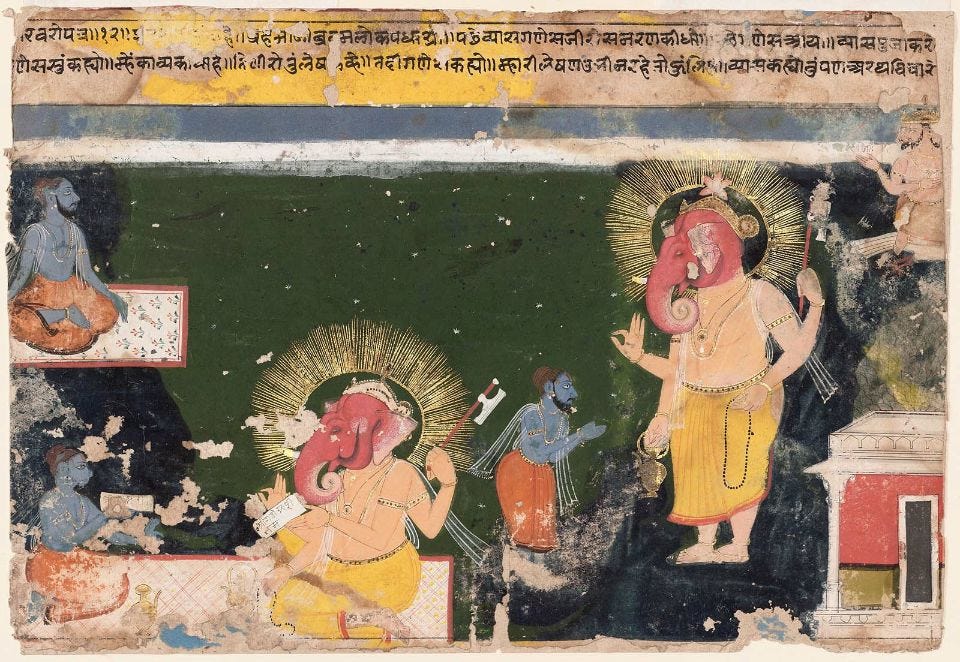Jayary Newsletter #44

A New Look
Change is good. As I switch from reading to reflecting in June, I am also taking the opportunity to switch email providers - back to Mailchimp after a couple of trials elsewhere. Why? Because Mailchimp is awesome, but also because I want to start including podcasts and videos at some point and it's a lot easier to do it here than anywhere else.
The Story of Life
I am death, destroyer of worlds
With that, we begin our journey within a journey. If there's one thing the Jaya understands, it's the mercilessness of time and the inevitability of death. After the war is over, Dhritarashtra tells Sanjaya that the carnage wasn't his fault, that his sons exploited his love.
"When Draupadi was dragged into the hall by Dushasana, I knew war was inevitable," says the blind king in the middle of recounting the main storyline in a combination of lament and listing out the contents. "Eighteen akshauhini's of warriors died and only ten survived and at the end of it all, the kingdom is Yudhisthira's once again. Why did this happen"
Sanjaya is even less sympathetic to Dhritarashtra than Krishna was to Arjuna. "There's no point in crying, my lord; even the greatest of kings who conquered all four corner of the earth, performed great sacrifices and honoured their ancestors are all dead. Kala will always have his due."
We are a self-obsessed species, always glorifying our existence. The march of time is a constant reminder that all our efforts will dissipate. So what does one do: give up all hope or fight a futile battle? There's a third way: to tell a great story. A story is nothing less than life hitching a ride on the back of time.
Vyasa is the timekeeper of the human race. The Jaya is his attempt to commemorate his yuga with a story so complete that we never need leave its boundaries. But even Vyasa can't destroy time - at the end of our yuga, the Jaya will vanish.
Collapse
Here's a frightening thought: that the very nature of civilization is to end in violent collapse, or at the very least, suffer terminal decline after a catastrophic event.
Let's take a look at the modern period. Native American civilizations across the Americas collapsed after their encounter with the Europeans. MLK Jr famously said that the arc of the moral universe is long but it bends toward justice, but that's (arguably) true only when you look at the fate of African-Americans in the United States. What would he say if told that the Americas had upwards of hundred million people of whom only a few hundred thousand survived the European encounter?
Now, collapse isn't unique to humans. An asteroid might have wiped out most of life on earth, but there's something cautionary about the way civilizations collapse - through violence that happens at a peak of sophistication and complexity, perhaps even caused by that sophistication. Our current sophistication is driven by a global use of fossil fuels and as we all know, it sure looks like we're heading toward collapse.
So what's the moral here? That civilization itself is prone to boom and bust cycles. We have heard that said about capitalist expansion, but what if capitalism is just a bubble accelerator?
From what I can see, the Jaya is keenly aware of this possibility, so add bubble logic to the list of topics we will cover in our month long review.
Contents
Everything is a story, including the contents of the story you're about to tell. Especially when the contents unfold into another set of contents and the new summary introduces us to yet another tale in which the suta tells the full story. Borges wrote a short fable about exactitude in science in which a society becomes so good at mapmaking that its maps can no longer be distinguished from the territory. Here's what Borges says:
"In that Empire, the Art of Cartography attained such Perfection that the map of a single Province occupied the entirety of a City, and the map of the Empire, the entirety of a Province. "
Now imagine a culture in which stories have attained perfection. Even the gods have certified their storymaking glory. A meeting is called by their parliament to honour their achievements and in that meeting a collective decision is made to compose the greatest story ever told, a story so large that it will cover the universe. A special act is passed with a large appropriation for the king of stories. The lawmakers delegate the task to a distinguished team of scholars, poets and scientists under the leadership of their most venerable sage.
When the storymaking team meets in the central hall of parliament they pose the most basic question of all: how should we tell this story? After a long debate, they arrive at a simple answer:
Announce that you're about to tell a story.
Unspool the announcement in one hundred and eight bullet points.
Expand each bullet point into a short chapter.
Collect all the short chapters in a small book.
Call the book "An Important Announcement"
Repeat with variations until an entire world is built out of announcements within announcements within announcements.
Announce that the world has been built.
It's a little silly, but it's also profound.


